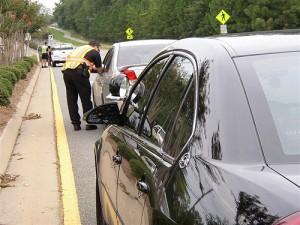 Any driver in California whose license has been suspended is prohibited from operating a motor vehicle. Should you choose to drive while your license has been suspended and be charged with additional traffic violations, it is possible that the California Department of Motor Vehicles could also charge you with being a habitual traffic offender.
Any driver in California whose license has been suspended is prohibited from operating a motor vehicle. Should you choose to drive while your license has been suspended and be charged with additional traffic violations, it is possible that the California Department of Motor Vehicles could also charge you with being a habitual traffic offender.
Whether or not you are charged as a habitual offender depends both on the nature of violations for which you are charged and how frequently the violations happened.
Basis for a Habitual Traffic Offender Charge
In California, you can be charged as a habitual traffic offender if you commit any of the following violations within a 12-month period while driving on a suspended license:
- 2 or more convictions for violations that carry two points
- 3 or more convictions for violations that carry one point
- 3 or more reported cases of accident
- Any combination of convictions or accidents that result in an accumulation of three or more points
Explaining Violations
- Violations that result in two license points include not only driving with a suspended license, but also such things as reckless driving, leaving the scene of the accident, vehicular manslaughter and driving under the influence.
- Most other traffic violations carry one license point. This includes such violations as speeding, failure to use an approved child safety seat or being responsible for a traffic accident.
- Reported cases of accidents are those that require authorities be notified and an official accident report be filed. This includes any collision that results in property damage of more than $750, physical injury to any vehicle occupants or the death of any vehicle occupants. Reports can be made in person or through your insurance agent, broker or attorney.
Potential Penalties and Jail Time for Habitual Traffic Offenders
A conviction of being a habitual traffic offender is very serious. In addition to any penalties you will receive for the traffic violations, you will receive an additional sentence for the habitual traffic offender conviction.
- For a first conviction, California law mandates a minimum of 30 days in jail, a fine of $1,000 and the possibility of one to five years of probation.
- A second conviction mandates a sentence of a minimum of 180 days in jail, a $2,000 fine and one to five years of additional probation.
- Court costs and other penalties could also be added to the fines.
- Jail sentences must be served consecutive to any jail time given for the actual traffic violations.
What Should You Do if You Are Charged?
Even though it is serious, being charged as a habitual traffic offender does not mean that you will be convicted. Many people find that hiring an attorney who is experienced in handling traffic violations is a wise idea. These lawyers are well-versed in the law, and they know the workings of the court system where your case will be heard. Your lawyer may be able to get the habitual traffic offender charge reduced or even dismissed, resulting in a far less severe penalty.
In order to ensure that your attorney has enough time to bring about a favorable result in your case, it is best that you consult them as soon as possible after you are formally charged.
So, stay away from being issued a ticket for being charged as a habitual traffic offender by refraining from driving while your license is suspended. This conviction could result in severe penalties, a lengthy jail sentence and costly fines. And if you are charged, you can seek the advice of an experienced attorney, explore your options and give yourself the best chance for a favorable outcome.
[Image: http://www.flickr.com/photos/peds_org/3096261060/]
Scott Desind
Latest posts by Scott Desind (see all)
- How to Request the County Seat and Fight Your California Traffic Ticket - May 21, 2023
- Don’t Even Touch That Cell Phone - July 13, 2022
- Innocent Until Proven Guilty - March 2, 2020

